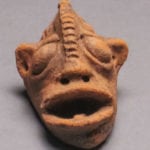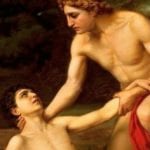 Creepy
Creepy  Creepy
Creepy  Movies and TV
Movies and TV 10 Movies That Get Elite Jobs Right, According to Experts
 Weird Stuff
Weird Stuff 10 Times Real Laws Were Based on Bizarre Hypotheticals
 Animals
Animals 10 Inspiring Tales of Horses Being Human
 Mysteries
Mysteries Top 10 Haunting Facts About the Ghost Ship MV Alta
 History
History 10 Surprising Stories About the Texas Rangers
 Humans
Humans 10 Philosophers Who Were Driven Mad by Their Own Theories
 Miscellaneous
Miscellaneous 10 Video-Game-Worthy Weapons and Armors from History
 Weird Stuff
Weird Stuff 10 Psychics Who Accurately Predicted Wartime Events
 The Arts
The Arts 10 Pieces of Art Inspired by a Broken Heart
 Creepy
Creepy 10 Death Superstitions That Will Give You the Creeps
 Movies and TV
Movies and TV 10 Movies That Get Elite Jobs Right, According to Experts
 Weird Stuff
Weird Stuff 10 Times Real Laws Were Based on Bizarre Hypotheticals
Who's Behind Listverse?

Jamie Frater
Head Editor
Jamie founded Listverse due to an insatiable desire to share fascinating, obscure, and bizarre facts. He has been a guest speaker on numerous national radio and television stations and is a five time published author.
More About Us Animals
Animals 10 Inspiring Tales of Horses Being Human
 Mysteries
Mysteries Top 10 Haunting Facts About the Ghost Ship MV Alta
 History
History 10 Surprising Stories About the Texas Rangers
 Humans
Humans 10 Philosophers Who Were Driven Mad by Their Own Theories
 Miscellaneous
Miscellaneous 10 Video-Game-Worthy Weapons and Armors from History
 Weird Stuff
Weird Stuff 10 Psychics Who Accurately Predicted Wartime Events
 The Arts
The Arts 10 Pieces of Art Inspired by a Broken Heart
Top 10 Fascinating Gay Texts From History
Some people seem to think that before it became legal gay people simply did not exist. Since February is LGBTQ history month it might be a good idea to look back in history and see some of the writings that have survived by and about gay people. It turns out that there have always been examples of same-sex attraction that would be labelled gay today and some gay people have written movingly about their experiences.
Here are ten of the most fascinating gay texts from history.
10 Strange Attempts To Create A Real-Life Gaydar
10 Sappho
Sappho of Lesbos was one of the most revered poets of the ancient world. Born around 630 BC she was called by some ‘the Tenth Muse’ because of the beauty of her words. Her poetry was collected and preserved in the Library of Alexandria in nine whole scrolls – unfortunately almost all of it is now lost. Only a few quotations and fragments recovered from the sands of Egypt are all we have.
It was the subject of Sappho’s poetry that is and was most shocking. In a time when women were meant to be sedate and mostly invisible she wrote explicitly about the love that developed between women. There’s a reason both Sapphic and Lesbian came to signify homosexual relations between women. Some of her poems express the joys that love between same-sex love can bring. Others address the pain that comes with parting.
Frankly I wish I were dead
When she left, she wept
a great deal; she said to me,
“This parting must be
endured, Sappho. I go unwillingly.”
9 Catullus
Catullus was a Roman poet of the first century BC. He knew all the most important people in Rome and often included them in his poetry. Cicero, Pompey the Great, and Julius Caesar all feature in his work. Not all of them were happy, given the tone of his work. Catullus was a scathing writer who lampooned other people’s foibles. Caesar thought that Catullus had seriously harmed his reputation with his poetry but when Catullus apologised he invited him to dinner.
One of Catullus’ favourite topics was love, or at least sex. Every sort of relationship makes an appearance. In his gay works Catullus talks about his own relationships with men.
“Your honeyed eyes, Juventius,
if one should let me go on kissing still,
I would kiss them three hundred thousand times,
nor would I think I should ever have enough,
not if the harvest of our kissing,
were thicker than the ripe ears of corn.”
Not all of his poems are so tender. One is almost untranslatable because of the filthy language he addresses to two of his male critics.
“Because you’ve read of my countless kisses,
you think less of me as a man?
I will sodomise you and skull-f**k you.”
8 Alcuin
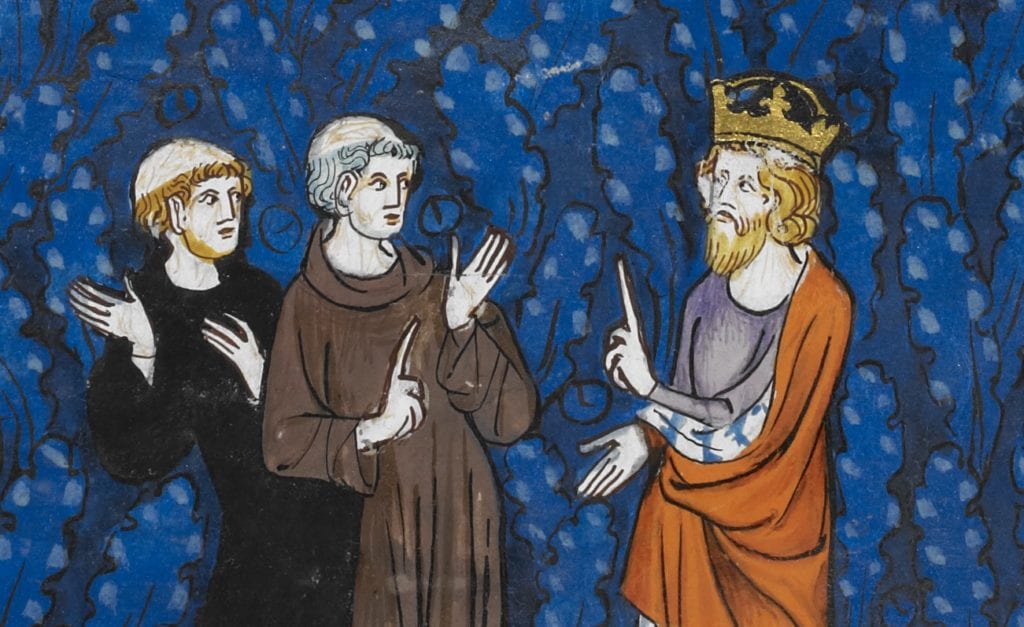
“O cuckoo that sang to us and art fled,
Where’er thou wanderest, on whatever shore
Thou lingerest now, all men bewail thee dead,
They say our cuckoo will return no more.”
These are the words of one of the greatest minds of the 8th century mourning one of his male ‘friends’ leaving his monastery. Alcuin of York was a monk and scholar who became one of Charlemagne’s closest advisors. He also became very close to some of the other monks he lived and worked with. The cuckoo of the poem above was one of Alcuin’s associates who had to leave. “Alcuin the old man thinks long for thee.”
It was not only in poetry that Alcuin expressed his love for other men. Some of his letters to other men have been regarded as beautiful examples of gay love letters.
“I think of your love and friendship with such sweet memories, reverend bishop, that I long for that lovely time when I may be able to clutch the neck of your sweetness with the fingers of my desires. Alas, if only it were granted to me… to be transported to you, how I would sink into your embraces,…how much would I cover, with tightly pressed lips, not only your eyes, ears and mouth, but also your every finger and toe, not once but many a time.”
7 Nuns
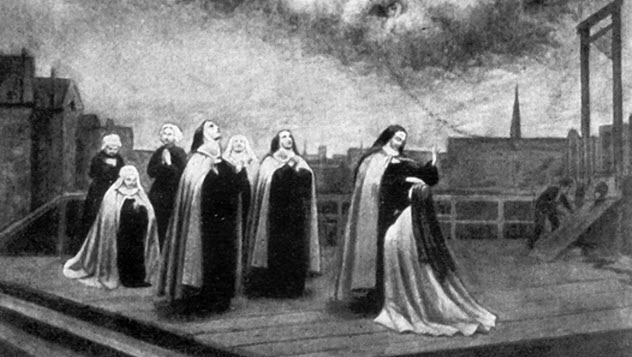
If you keep people in a same-sex environment for long periods of time you often find that deep emotional bonds form. Sometimes these spill over from the bounds of friendship into romantic pairings. It is true now and it was true in the almost entirely female world of medieval nunneries. The nuns of these establishments have left written records of their devotion to one another that it is very easy to read as gay.
“I love you above all else,
You alone are my love and desire…
Like a turtledove who has lost her mate
And stands forever on the barren branch,
So I grieve ceaselessly
Until I enjoy your love again.”
This letter was written between two Bavarian nuns in the 1100s and there are others of a similar age that survive.
“Everything pleasant and delightful
Without you seems like mud underfoot.
I shed tears as I used to smile,
And my heart is never glad.
When I recall the kisses you gave me,
And how with tender words you caressed my little breasts,
I want to die
Because I cannot see you.”
6 Virgil
“The shepherd Corydon with love was fired
For fair Alexis, his own master’s joy:
No room for hope had he, yet, none the less,
The thick-leaved shadowy-soaring beech-tree grove
Still would he haunt, and there alone, as thus,
To woods and hills pour forth his artless strains.”
So begins the second Eclogue of Virgil, the national poet of the Romans. Much better known for his epic poem The Aeneid Virgil also wrote poems about the joys of the countryside. And in the second Eclogue one of those joys is the love between the shepherd Corydon and a boy called Alexis.
Corydon mourns that Alexis is not content to be the lover of a poor shepherd.
“Ah! were you but content with me to dwell.
Some lowly cot in the rough fields our home.”
Instead of being some happy pastoral Brokeback Mountain this poem shows the pain that unrequited love can inflict on gay people, just as it does straight people. The name Corydon was later borrowed by the writer Andre Gide for the title of his book of dialogues on homosexuality.
5 Michelangelo
Michelangelo di Lodovico Buonarroti Simoni, better known as simply Michelangelo, was one of the greatest artists of the Renaissance. Despite his mastery of painting and sculpture there is something distinctly odd about the women he depicted. Oddly muscular, manishly proportioned, and with stuck-on breasts they often look like very handsome men.
Michelangelo seems to have fallen in love with an Italian nobleman called Tommaso dei Cavalieri who the artist described as “light of our century, paragon of all the world.” One biographer of the time said “Infinitely more than any other friend, Michelangelo loved the young Tommaso.” Tommaso sparked art and poetry from the older Michaelangelo. When Michelangelo’s homoerotic poetry was published after his death his descendent changed all the pronouns from male to female. In one poem Michaelangelo dreamed of being a silkworm so that he could be turned into clothes that would be worn next to Tommaso’s skin.
“All through the day he’d clasp me! Would I were
The shoes that bear his burden! When the ways
Were wet with rain, his feet I then should kiss!”
4 Achilles and Patroclus
The Iliad begins by describing the wrath of Achilles. Achilles, greatest of the Greek warriors is a wrathful person, as well as being petulant and arrogant. The only person he seems to show any tenderness towards is his young colleague Patroclus. When Patroclus is killed in the course of battle the poem describes Achilles’ breakdown at the news.
“A black cloud of grief enwrapped Achilles, and with both his hands he took the dark dust and strewed it over his head and defiled his fair face, and on his fragrant tunic the black ashes fell. And himself in the dust lay outstretched, mighty in his mightiness, and with his own hands he tore and marred his hair. And the handmaidens, that Achilles and Patroclus had got them as booty, shrieked aloud in anguish of heart… And over against them Antilochus wailed and shed tears, holding the hands of Achilles, that in his noble heart was moaning mightily; for he feared lest he should cut his throat asunder with the knife.”
While the Iliad is never explicit about the romantic relationship between Achilles and Patroclus even people in the ancient world recognised it as such. Plato mentions that they were lovers. Fragments of a lost play by Aeschylus describe the pair’s “frequent kisses” and “devout union of the thighs.”
3 David and Jonathan
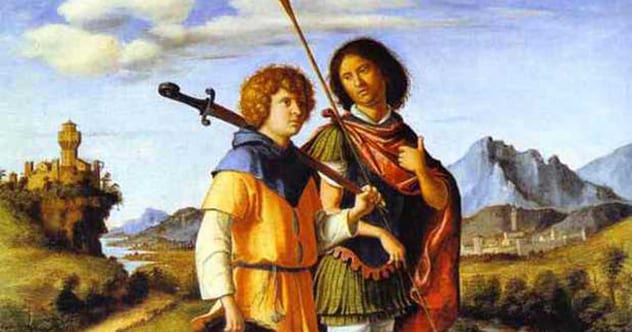
The Bible has been quoted by many who have homophobic attitudes to support their views. But some have read in the story of King David a gay love that was incorporated into the canon of the Bible. For some there was more than friendship between David and Jonathan.
1 Samuel 18 begins “After David had finished talking with Saul, Jonathan became one in spirit with David, and he loved him as himself.” This partnership only deepens. “Jonathan made a covenant with David because he loved him as himself.” The Bible then records how “Jonathan took off the robe he was wearing and gave it to David, along with his tunic, and even his sword, his bow and his belt.” Several times it is said that Jonathan loved David “as he loved himself.”
When Jonathan dies David exclaims “I grieve for you, Jonathan my brother; you were very dear to me. Your love for me was wonderful, more wonderful than that of women.” Some have disputed the homosexual reading of this story but it has brought comfort to some gay Christians.
2 De Profundis
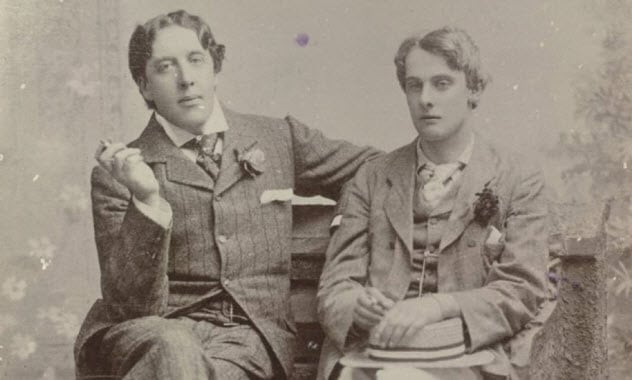
When love goes wrong, be it gay or straight, it can go very wrong. For Oscar Wilde it went just about as wrong as it could possibly go. Wilde suffered one of the worst falls from the heights of success in the Victorian era. A poet, author, and playwright Wilde was a father and husband but he also had a predilection for gay sex in male brothels and with young lovers. When the Marquess of Queensbury objected to Wilde’s relationship with his son Alfred ‘Bosie’ Douglas (sixteen years his junior) it led to trials that saw Wilde locked up for two years.
In his jail cell Wilde had time to consider his relationship with Bosie. The result was a letter to his lover called De Profundis – From The Depths. Bosie was a terrible person by all accounts and now Wilde recognised just how low his love for Bosie had brought him.
“Out of my nature has come wild despair; an abandonment to grief that was piteous even to look at; terrible and impotent rage; bitterness and scorn; anguish that wept aloud; misery that could find no voice; sorrow that was dumb. I have passed through every possible mood of suffering.”
The letter is a minute dissection of how whether you are gay or straight love can change your life. Wilde tells Bosie “Of course I should have got rid of you,” but he never did. Despite everything Wilde was not able break off his affection for Bosie.
1 Plato’s Symposium
Have you ever heard the term ‘finding your other half’? It can be traced all the way back to the writings of Plato and a text that includes one of the most moving images for what love is. In The Symposium a group of upper class and well educated men meet to discuss the topic of love. Since it takes place in ancient Greece the love under discussion tends towards the homosexual. When it is time for Aristophanes, the Greek comedian, to give a speech on love he tells a myth that explains the creation of love – homosexual and heterosexual.
In the beginning, Aristophanes says, “the sexes were not two as they are now, but originally three in number; there was man, woman, and the union of the two.” These original people were like two people stuck together back to back with two faces, four legs, and four arms. Some were two men stuck together, some two women, and some a man and a woman. Unfortunately these people got arrogant and displeased the gods. Zeus cut them in two.
Now, according to this story, we are all just half people wandering around in search of our other half. When a man was originally part of double-man he is homosexual, when a woman was part of a double-woman she is lesbian, and the mixed people became heterosexual. It is only when we find the half that has been cut from us that we feel complete – and that is why love feels so good.

